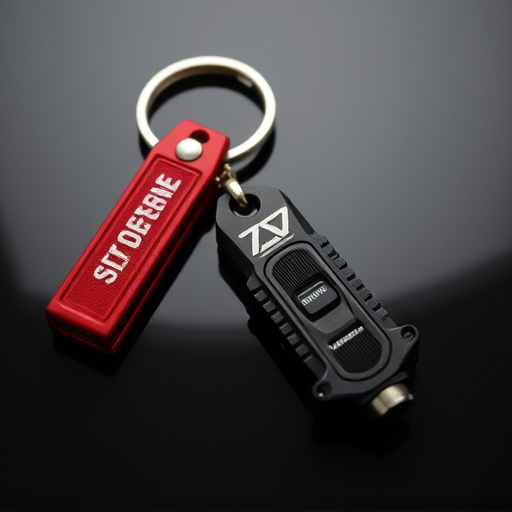Understanding the legal limits of self-defense keychains with metal knuckles is crucial; definitions vary across jurisdictions, with some regions banning specific types of bladed instruments, even on keychains. These keychains offer a compact and discreet solution for personal safety, featuring durable materials and tools like flashlights or window breakers. While they empower individuals in various situations, their compact size may limit effectiveness. Choosing the right self-defense keychain involves considering quality metals, multiple defense mechanisms, ease of use, and quick release mechanisms. Always check the local Prohibited Keychain Weapons List to comply with legal requirements.
“Discover the power and potential pitfalls of self-defense keychains equipped with metal knuckles. With their compact design, these tools promise immediate protection, but understanding legal boundaries is crucial. This article explores what constitutes a prohibited keychain weapon, delves into their unique design and functionality, and weighs the pros and cons of carrying such a device. Learn essential features to consider when choosing a self-defense keychain, especially in regions with strict laws on prohibited keychain weapons list.”
- Understanding Legal Limits: What Constitutes a Prohibited Keychain Weapon?
- Design and Functionality of Self-Defense Keychains with Metal Knuckles
- Pros and Cons of Carrying a Keychain as a Self-Defense Tool
- Choosing the Right Self-Defense Keychain: Features to Consider for Safety
Understanding Legal Limits: What Constitutes a Prohibited Keychain Weapon?
When considering a self-defense keychain with metal knuckles, it’s crucial to understand the legal limits surrounding such devices. The definition of what constitutes a prohibited keychain weapon varies across jurisdictions, and what might be legal in one place could be strictly forbidden in another. For instance, some regions have specific laws against carrying certain types of knives or bladed instruments, even on keychains.
Prohibited keychain weapons list typically includes items with sharp blades that can cause serious harm or injury. This can range from simple knifes to more complex designs like tactical pens or multi-tools with cutting edges. It’s essential to research and comply with local laws to avoid legal repercussions. Staying informed about the permitted and prohibited items in your area ensures you’re using your self-defense keychain responsibly and within the law.
Design and Functionality of Self-Defense Keychains with Metal Knuckles
Self-defense keychains equipped with metal knuckles have emerged as a compact and discreet option for personal safety, blending functionality with convenience. These keychains typically feature a small, easily portable design that fits comfortably on one’s keys or even in a pocket. The metal knuckles are strategically placed to allow users to quickly grasp them during an emergency, providing a surprising level of force and protection against potential attackers.
The design often incorporates durable materials such as high-quality steel for the knuckles, ensuring they withstand regular use and maintain their sharp edges. Some models also include additional features like a built-in flashlight or a window breaker to enhance versatility. Despite being categorized as prohibited keychain weapons in many regions due to their potential as defensive tools, these devices offer an accessible solution for individuals seeking to empower themselves in various situations, from everyday street encounters to more extreme scenarios.
Pros and Cons of Carrying a Keychain as a Self-Defense Tool
Carrying a keychain with metal knuckles as a self-defense tool has its advantages and disadvantages. One clear benefit is its discreet nature; keychains are everyday items, making it easier to carry a potential defense mechanism without drawing unwanted attention. This can be particularly useful for individuals who prefer to be prepared for any situation without appearing intimidating. Moreover, the compact design allows for easy storage in pockets or bags, ensuring accessibility when needed.
However, there are also considerations to keep in mind. Some regions have strict laws regarding prohibited keychain weapons, including metal knuckles, which can result in legal consequences if carried inappropriately. Additionally, while the keychain offers a quick and accessible defense option, it may not be as effective as traditional self-defense tools in every scenario. The size limitation can restrict its usage in certain situations, and it might not provide the same level of protection or range as other self-defense mechanisms.
Choosing the Right Self-Defense Keychain: Features to Consider for Safety
Choosing the right self-defense keychain involves understanding features that ensure your safety and comply with local laws. One key consideration is the type of metal used; high-quality, durable metals like steel or aluminum are preferred for their strength and longevity. Additionally, look for a design that incorporates multiple defense mechanisms, such as metal knuckles, pepper spray, or alarms, offering various options based on different situations.
Another important aspect is size and ease of use. A compact keychain with a smooth, ergonomic design makes it easy to carry discreetly without drawing unwanted attention. Moreover, check if the device has a quick-release mechanism for effortless deployment during emergencies. Lastly, familiarize yourself with your area’s prohibited keychain weapons list to ensure your chosen self-defense tool complies with legal requirements, thus avoiding any potential issues.
When considering self-defense keychains with metal knuckles, it’s crucial to balance functionality with legal limits. While these tools can offer a sense of security, understanding your local laws regarding prohibited keychain weapons, like those listed above, is essential. By weighing the pros and cons and choosing a model that aligns with safety features, you can make an informed decision. Remember, the right self-defense tool should enhance your peace of mind without putting you at legal risk.
